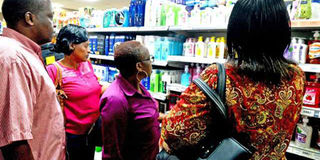Panic-shopping as virus reality dawns

Shoppers at Naivas Supermarket, Kenyatta Avenue branch in Nairobi shop for hand sanitisers following the first reported case of coronavirus in the country. PHOTO | FILE | NATION MEDIA GROUP
What you need to know:
- As at Sunday, the World Health Organization had documented 142,539 cases of Covid-19 from 135 countries.
- Fights have broken out, trolleys piled high, pushing city supermarkets like Carrefour to limit the number of sanitisers a person can buy.
It is imminent that coronavirus (Covid-19) could spread in Kenya, after news that two more people tested positive for the disease.
As cases of the virus rise globally, people are rushing to stock goods like hand sanitiser, canned foods and toilet papers.
As at Sunday, the World Health Organization (WHO) had documented 142,539 cases of Covid-19 from 135 countries. Another 5,393 people have died from the disease.
As soon as Health Cabinet Secretary Mutahi Kagwe broke the news of the first confirmed case, Kenyans went into panic-buying.
Fights have broken out, trolleys piled high, pushing city supermarkets like Carrefour to limit the number of sanitisers a person can buy.
SANITISERS
Masks were the first to go. Then, hand sanitisers. In fact, many pharmacies in Nairobi have run out of supplies for hospital-grade sanitisers. Now, the new coronavirus-panic-buyers are snatching up … toilet paper?
Dubbed #ToiletPaperPanic and #ToiletPaperApocalypse online, there is no shortage of videos capturing the mass hysteria as shelves are cleared. Canned goods, water bottles and pasta shelves have similarly been emptied.
Michael Baker, a professor of public health at the University of Otago in Wellington, New Zealand, told Al Jazeera that the ongoing crisis is similar to a behavioural response during a natural disaster.
“The difference this time is that people now see Covid-19 as a real threat, one that will last for months, and they may not have confidence in the authorities to contain it,” he says.
Insufficient information on the new coronavirus is also playing a factor in people's response, while current measures taken by the authorities do not seem to have reassured the masses.
It’s important to stock up on some things, experts say. But hoarding unnecessary items can deplete the supply for everyone else. People should not panic, but if the potentially deadly illness — lands you in quarantine, it is well-advised to have a sensible supply of food, water and other essentials.
CONTINOUS SUPPLY
“Store a two-week supply of water and food and check your regular prescription drugs to ensure a continuous supply in your home,” the US Department of Homeland Security says.
The site says, during a pandemic, you may want to reduce grocery runs to avoid exposure to people, or stay at home to protect others if you do get sick.
Supply shortages and cleaned-out store shelves might also make it tough to find what you need in the moment. Here’s what you should have on hand: Two weeks' worth of food and water for everyone in your home, including pets.
A continuous supply of prescription medications. You might have to get special approval from your healthcare provider and/or insurance company to do this.
You need a first aid kit and nonprescription medications, such as fever reducers and pain relievers, rehydrating fluids, vitamins and cough or cold medicines. Hygiene products, including two to four weeks' worth of hand soap, shampoo, deodorant, diapers and tampons or pads are needed.
You also need cleaning supplies, including trash bags, washable rags and disinfectant and/or bleach.
You don’t have to run out and buy everything all at once.
But if it looks like a pandemic could affect you or your community, you might want to start buying a little extra every shopping trip, if at all possible.





